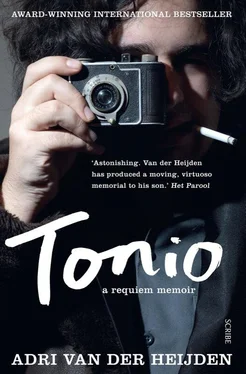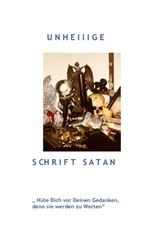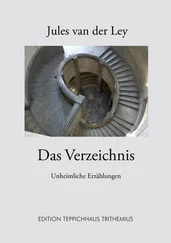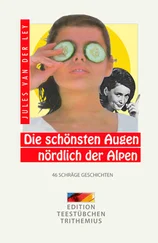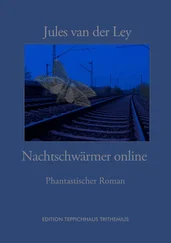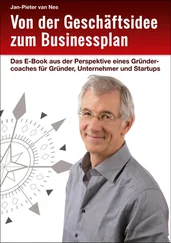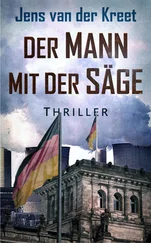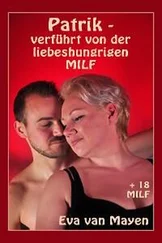Jakob lived a ways further up the street. His father still lives there. One afternoon, there was a misunderstanding between Mama and Grandma Wies. Grandma was supposed to pick you up from school on a different day than usual and take you to play at her place on the Eemstraat, because she had already left Grandpa Natan. Someone must have made a mistake, because no one came to fetch you. Jakob’s dad, who came to pick up his son, waited with you for a long while.
‘So where does your granny live, Tonio?’
‘On the Eenstraat, I said so already, jee pers.’ And more vehemently: ‘The Eenstraat, Joost, the Een straat!’ Do you remember, Tonio, how the incident turned out? All right in the end, apparently: we didn’t have to put out an Amber Alert, or whatever the missing-child alarm was called in those days.
Oh, so you’re cycling further? I notice I’m still trying to tinker with your timing. A second here, a second there. You’re now passing Joost and Jakob’s house on Jan Luykenstraat. They hosted the reception after the school play that marked the end of primary school. While the parents drank cocktails in the living room, you and Jakob and your classmates retreated to the basement. It was so quiet down there, contrary to all our expectations, that after a while one of the mothers, maybe Afra’s, went to make sure you hadn’t all been asphyxiated in the closeness of the basement. She came back nonplussed.
‘They’re sitting there, crying. All of them.’
From that moment on, a group of mothers periodically descended to the cellar. When the door opened, the bawling could be heard above the adult hubbub upstairs; the sobbing persisted shamelessly. Miriam returned, pale, from the basement.
‘Incredible, what a pity party,’ she said. ‘I’ve never seen so much childhood anguish in one place.’
‘Tonio, too?’ I asked.
‘Yeah, what do you think. They’ve just realised they might never see each other again. I don’t know who it started with, but they’ve set each other off.’
Once in a while, a mother herded her big baby into the living room, where he or she, red-eyed, could cool down before being allowed to return downstairs to the orgy of blubbering. When Miriam decided it was time to take you home, you came to say goodnight to me with a face withered by prolonged crying. You couldn’t muster up a smile anymore. It was for real.
11
Are you grinning right now, on your bike, as you think back on that bawl-fest? Or does it make you wistful, because time has so bitterly confirmed your classmates’ cellar-snivelling? That was goodbye. From that basement, you split up and swarmed to high schools across the city. In the course of the past ten years, you bumped into an old classmate from the Cornelis Free now and then, but these were mostly awkward encounters. The old camaraderie had been left behind in the Nijsen family’s basement.
At the end of the Jan Luyken, the massive, dark-red Rijksmuseum looms to your right. You’ve always thought it intriguing that the largest and most valuable of the city’s treasures just hang there in the dark, unseen, their fate in the hands of a soulless security system.
Left onto the Hobbemastraat. The asphalt glistens with embedded bits of glass, as though the road surface is mirroring the starry night above, but you’re too tired to lift your head and cast your eyes upward. You do see, in a flash, the book stalls set up on either side of the street for an Uitmarkt some ten years ago. You and I stood behind the table at my publisher’s stand, signing books together.
You’ve got other things on your mind now: a döner kebab from the Turkish snack bar. It was your favourite lunch when you worked at Dixons — plenty of shawarma joints in the Kinkerstraat neighbourhood. Heading toward your destination, you cycle between the tram rails of lines 2 and 5. You pass the leather-goods store where we bought Mama that red-brown set of bags for her fortieth birthday. You always managed to send costs skyrocketing with your expensive taste. You enjoyed giving presents even more than getting them. ‘She’s sure to want a toilet bag, too … don’t you think, Adri? Look, it’s made of the same leather. And here, this carry-on bag, the same leather, too.’
No, the leather-goods store doesn’t ring any bells with you tonight. Your thoughts have narrowed to Jenny and döner kebab. The traffic lights at the crosswalk at the corner of the Park Hotel blink lazily. Ach, that Jenny. How she turned a quarter-turn, at your request, in order to benefit more from the reflector sheets … and you, bent over the tripod with the reflecting umbrella above your head. More like a parasol … You might still have the presence of mind to cast a glance to your right, past the yellow flashing lights. A taxi is just driving over the crosswalk. On that side, the Stadhouderskade is otherwise empty.
And to the left? If you didn’t first look left, was it because there was no sound coming from that side? Or were your ears still pounding from the beats of techno-animal Carl Craig?
Maybe you were a bit dizzy from doing those dance dips with Dennis.
12
We provided Tonio with plenty of toys. He had a way of charming us out of anything his heart desired. Grandma Wies once said: ‘You always get your way in the end.’ She made a fake-suffering face to go with it. From that moment on, Tonio seemed to see it as his job, refining his charm as he went, to get his way. A teary eye was often more than enough.
The expensive problem was that once Tonio had figured out the mystery of a toy, he got bored with it. He could put together, one-two-three, a technical Lego set intended for age groups far above his own, but the then secret formula had been cracked. At best, the resulting construction could be expanded with accessories and attachments, which kept costs down. But usually his eye fell upon an entirely new challenge, complete with flashing lights, rolling caterpillar tracks, and an electrical transformer.
He constructed a power-driven Ferris wheel out of a K’Nex building set; it was so tall he had to use the kitchen stepstool to reach the top. When I pointed this out, he replied: ‘The Ferris wheel on Dam Square is higher.’
Roller skates. A super-manoeuvrable silver-coloured kick scooter. The radio-controlled jeep with tractor tyres. Warhammer armies, complete with half a paint studio to decorate the miniature soldiers and their arsenal.
Computers and laptops, the toys of the growing adolescent. The games that went with them. The software.
After he turned eighteen, he expanded his playing field to the cafés where you had to be seen. Club Trouw, where he spent his last night: wasn’t that, with all its techno music, his final plaything? The outcome of a lifetime of toys? And there had to be a bicycle, too, on which to ride home, spaced out. From technical Lego via a headful of technopounding on his way to a Media Technology degree — somewhere in the process, at a crucial point, he was scooped up and thrown down. Then came the ambulances, and he was subjected to medical technology, with which they had hoped to piece him back together.
13
Even murder serves a purpose, no matter how perverse. It is, after all, the aim of the murderer to bump off his victim. There is, likewise, apparently, a point to a soldier felled on the battlefield: he does it for his fatherland; he is cannon fodder in service of the triumph over Evil.
And the victims of a terrorist attack? At least in the eyes of the person who gave the order, their death had a purpose. The more casualties, the more successful the operation. Not only suicide terrorists, but their victims, too, die for their country, judging from the memorial services and plaques organised from higher up.
Читать дальше
